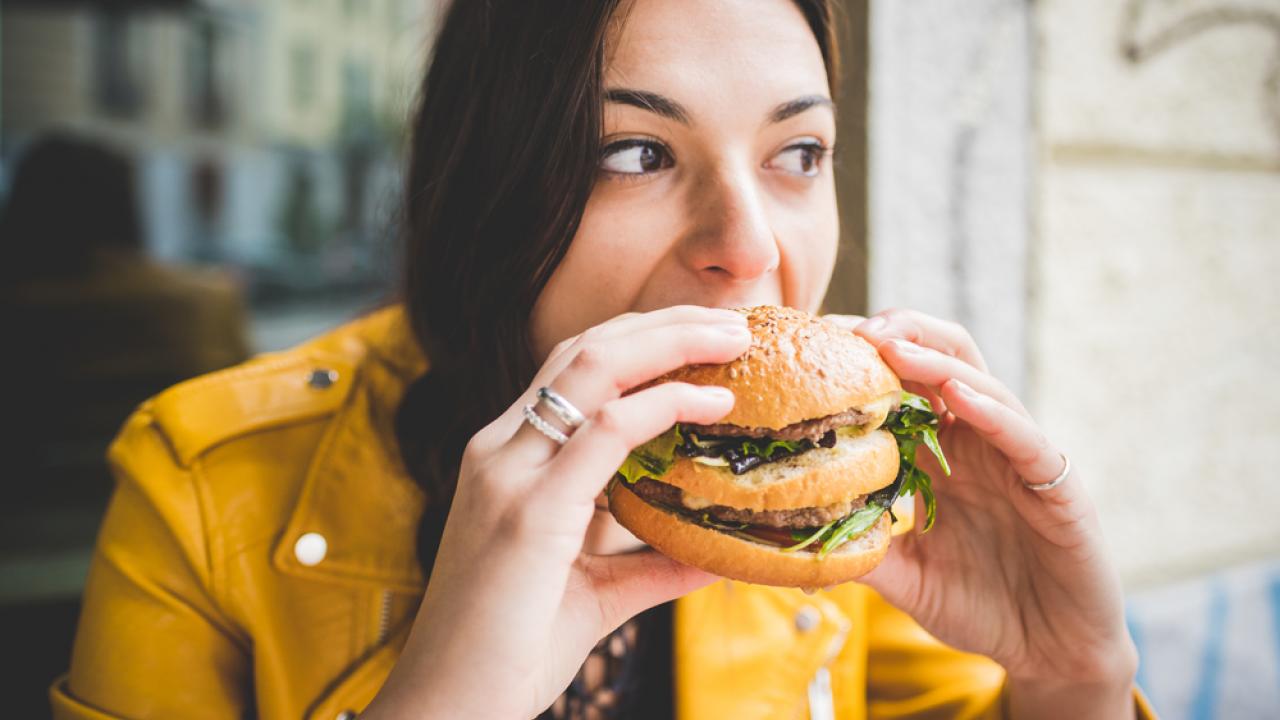The other day I decided to go downtown for dinner. I chose to go to a new Thai place, as Thai food is something I probably eat only every 6 months or so. While I enjoy it, I often overindulge and so I keep it as a once-in-a-while type meal for myself. I left, stuffed to the brim and happy as can be. As I was walking back to my car, I passed a bakery I’ve been wanting to try, with a robust and beautiful display of desserts in the window. The next thing I know, I’m inside being overwhelmed by the aroma of fresh-brewed coffee, cinnamon, chocolate, and frosting. So I buy two different types of baked goods and sit myself down at the cutest table to wait. I think to myself, I’m sure, not hungry, but here I am anyway, because what a treat! Flash forward to the end of the night, I’m laying in bed 4 hours past when I usually doze off, stuffed, with heartburn and regret boiling in my throat, wondering why I succumbed. Why did I eat what I wanted to eat knowing that I’d feel this way?
Hunger vs Appetite - What’s The Difference
There are two mechanisms in our human body that drive us toward food: hunger and appetite. [R]
What Is Hunger
Hunger is a psychological drive for food that occurs when the body senses that we need food for energy, biological mechanisms, and functioning. [R] It’s pretty nonspecific and this is why everything at the store sounds good enough to eat, no matter how good or bad it is, when you go grocery shopping on an empty stomach (guilty!).
What Is Appetite
Appetite is just the opposite. It’s a psychological desire to eat specific foods based on a variety of things, like our environment, emotions, mood, culture, etc.. [R] If you eat a meal that nourishes you and keeps you fed, chances are when you go to the grocery store, you just buy what you need and get out, no problem.
While we’d love to think that hunger vs appetite exists in this perfect black and white world where they’re completely separate from one another, unfortunately, like most things in life, these two states actually coexist, working together to satisfy our body’s need for nutrients.
False Hunger Cues - Your Appetite Is To Blame
So why did I fall victim to the bakery, even knowing how full I was from my Thai food? You can experience an appetite or a hankering without hunger. This is why those baked goods seemed to go down so easy, even though I wasn’t actually hungry. The opposite is possible too, which is seen in the form of disorders like anorexia, where you may experience a psychological desire or need for food, yet have no appetite (your last breakup, anyone?). [R]
The Hypothalamus & The Hunger Response
Has your stomach ever hurt when you’re hungry? That’s because hunger is more psychological than just physical. Your brain is responsible for signaling to the body that it needs to physically find food, soon. The brain is responsible for your tummy hurting when you’re hungry, with the tissue in the driver’s seat is called the hypothalamus. The hypothalamus is one of the best-studied and most important brain regions involved in the central control of feeding and energy expenditure in the human body. [R]
The hypothalamus is located in the brain, above the pituitary gland in what’s called the ‘forebrain’. This part of the brain regulates close to all of our involuntary activity, like signaling that the body needs nutrients, like food or water. The hypothalamus is also responsible for telling us when we’re full via nerve cells, hormones, and the food itself that we consume. [R]
Hunger vs Appetite - The Role Of Nerve Cells
There are special cells within the stomach and the small intestine that measure changes in the pressure of these areas. [R] Pressure changes indicate whether they have food in them or not. The information that the cells take in is relayed to the hypothalamus which is then able to take that information and use it to tell you if you are hungry or full.
Hunger vs Appetite - The Role Of Hormones
Hormones are chemical messengers that are released into the bloodstream by various glands in the body. When hormones are released, they regulate one or more bodily functions. When it comes to eating food, there are two main hormones produced by the pancreas called insulin and glucagon. [R]
Ever felt a little irritable when you haven’t eaten in a while, or even feel a little light-headed? This is thanks to these two hormones! [R] Insulin and glucagon are responsible for maintaining healthy blood glucose (blood sugar) levels within the human body, which happens to be our most readily available energy supply.
Blood glucose levels are influenced by when you eat. When you don’t eat for a while, insulin and glucagon aren’t released, and blood glucose lowers. [R] After a while, the hypothalamus indicates to our body that we need to eat something so that we can get these levels up.
Once we’ve eaten, the pressure in our stomach increases, the nerves signal to the hypothalamus that we’re getting food, our pancreas produces hormones, and our blood glucose levels rise. [R] This is when the feeling of fullness or satiation kicks in.
However, even though this process is simple, we have the ability to override this system with our brain (like I did after eating Thai food), overtime becoming adept at ignoring them and understanding when we’re hungry and when we’re not accurately full. We ignore them and eat too much and we often ignore them and eat too little. Ignoring them can lead to an imbalance in hunger hormones, and it can take time to reset these through proper nutrition and healthful nutrition tactics.
It’s important to note that there are other hormones and hormone-like substances that work together with the hypothalamus that tell us when we’re hungry or full. Examples of those are leptin, galanin, serotonin, cholecystokinin, ghrelin, and neuropeptide Y, to name a few. [R]
Hunger vs Appetite - The Role Of Food
It’s no secret that the better quality food you eat the better you’re going to feel. Food isn’t just fuel and your body isn’t just a Ferrari with a combustible engine. Food is information that each bite tells your body to perform a certain function.
Foods that have protein provide the greatest satiety as compared to those packed full of empty carbohydrates. Diets that are higher in fat have higher satiety value as compared to high carbohydrate diets. [R] This is why a breakfast with bacon and eggs will get you further throughout your day than pancakes and syrup will.
An important nutrient to make sure you include in all your meals is fiber and water. These two components bulk up our meals, helping the stomach to stretch at a faster pace, signaling to the hypothalamus (because of the pressure change, remember), so that we stop eating before we get stuffed or too full. [R] This is partially why it’s encouraged that you chew your food fully, drink water with food (or before a meal), and shouldn’t eat food distracted.
Think of it this way — if you’re trying to maintain or lose weight, eat slowly, drink something with it, and make sure there is a sufficient amount of fiber. Trying to gain weight? Eat fast and pummel that food before your stomach can signal to your brain that it’s eaten too much!
Our Environment Greatly Influences Our Appetite
Now that we’ve well established that hunger is prompted by internal signals, we’re going to dip into why appetite is triggered by what’s on the outside of the body. If we go back to my glutenous night out when I wandered into the bakery with a full stomach and bought not just one, but two desserts, then we can clearly understand how our bodies ‘work up an appetite’. The environmental factors that influence our appetite can be broken down into three main categories: sensory data, social/cultural cues, and learned behavior.
Working Up An Appetite - Sensory Data
Sensory data plays a huge roll in the way that we choose our food. Food stimulates us through our five senses: sight, smell, taste, texture, and sound. [R] They’re made by marketing geniuses to be appealing, appetizing, and desirable (fries on the back of a McDonald’s truck, anyone?).
Ever notice how food isn’t as appealing when we’re sick and can’t smell or taste? This is due to the sensory data from our food. Back in the day, it’d keep us from eating poisonous plants and animals, but nowadays, it can make us get fat, puffy, and fussy. Fruit is sweet and tasty, while vegetables are bitter, and this inherent instinct to protect ourselves from natural potions hasn’t gone away throughout our evolution as humans.
Working Up An Appetite - Social and Cultural Cues
Ah, there’s nothing quite like eating buttery popcorn and slugging down a cold, refreshing, popping coke at the movies, am I right? Good old social and cultural cues are to blame for this one!
Sure, we know it’s not good for us, but our brain’s association with going to the movies for years has trained us to want these things, even if we’re not hungry. In addition to sensory cues, social and cultural cues trick our brain into allowing ourselves ‘forbidden foods’ against our goals and fullness levels. [R]
For others, this could mean indulging during Thanksgiving, a tradition emotionally influenced by the cultural coming together of family and friends to practice thankfulness and gratitude to one another. In others, it could be the feeling of hunger at 8 am when you’re trying to intermittent fast, because you’ve eaten breakfast at 8 am for the last 45 years of your life, and you’re just now trying to change it. Are you really hungry or do you have an appetite for your 2 eggs and bacon? Other social and cultural influences include special occasions, locations, activities, sights and sounds, and billboards even.
Asking yourself if you’re hungry or if you have an appetite can help navigate the tricky emotional response to the external events in our lives. Like turning to food in search of comfort rather than our friends. This is where cravings and emotional eating are stemmed from, as well as the notion that food is a ‘reward’ system for positive behavior. We literally have the power to rewire our body to override our physical cues of hunger and fullness to satisfy our unhappiness, despair, and other emotions. When broken down like this, our decisions to eat food that’s bad for us seem pretty silly, don’t they?
Working Up An Appetite - Learned Behavior
Probably a lot of what you ate when you were a kid you still eat now as an adult. Most likely the foods known to your culture are ‘normal’ and when you see something from another country, it can seem a bit scary, like chicken feet, dogs, octopus, fish eggs, and maybe even tofu. Is it because it’s really bad for you or simply because you’ve learned to eat other things? When we’re introduced to food it takes time to get used to it, which is how we develop food preferences
Ideally, the best food preferences are ones that are nutritious, wholesome, and consumed in their raw form rather than processed form. The more you understand about your body and the food or the ‘information’ that you put in it, the more you can make decisions that improve your health, rather than impede it.
By learning more about our foods and choices we can then change our behavior to reflect this new information. [R] Instead of telling a child that they have to eat their vegetables because they were expensive, try connecting them to their food by the way of understanding what it does and why. The same can be said with your own preferences. Say you don’t like vegetables because they’re bitter, but you learn that without vegetables, you feed your chances of contracting life-altering diseases, so you find a new way to cook the vegetables and season them so that you don’t have to avoid them altogether. This is a learned behavior and it greatly influences our appetite.
We can also through this behavior learn what we don’t like. [R] If your mom sucked at making eggs on Saturday mornings but made you eat them because they’re expensive and there are ‘starving children in Africa’ (I can’t be the only one who heard my brother saying that when I didn’t eat my food), then you’re going to associate eggs as being a food you don’t like anymore. But hey, what the heck, eggs are good! Our lives are a series of learned behaviors, and with a little knowledge and willpower, you can actually change the way you look at and eat food so that you can become happier and healthier with time, causing you to investigate your own reasons of what you eat and when you do.
Hunger vs Appetite: In Conclusion
Understanding the difference between hunger and appetite can change your life for the better. While hunger and appetite are different processes, with hunger being a psychological factor and appetite being an environmental factor, the two coexist together and you ultimately have the power to override the system and stuff yourself at the bakery or to listen to your body and stop when you’re full at the restaurant. It’s empowering to realize that you can positively or negatively influence the way that you look and feel one meal at a time. So own it!
Need Help With Optimizing Your Diet And Nutrition Plan To Finally Get The Results You've Been Waiting For?
SWOLVERINE IS AN ENDURANCE ATHLETE AND ACTIVE LIFESTYLE BRAND. MADE FOR THE ELITE ATHLETE, AND THE STRONG-WILLED OUR PRODUCTS WERE DESIGNED TO FUEL YOUR ATHLETIC PERFORMANCE. WE PERFORM WHEN YOU PERFORM.
We believe that everyone can optimize not only their athletic performance but their human potential. The way we believe we can optimize performance is through transparency, clinically effective doses, and clinically proven ingredients with evidence-based outcomes. We provide the nutrients you need to power your active lifestyle.
References:
Hopkins, Mark. “The Regulation of Food Intake in Humans.” Endotext [Internet]., U.S. National Library of Medicine, 30 Mar. 2016, https://www.ncbi.nlm.nih.gov/books/NBK278931/.
Al-shawaf L. The evolutionary psychology of hunger. Appetite. 2016;105:591-5.
Bilman E, Van kleef E, Van trijp H. External cues challenging the internal appetite control system-Overview and practical implications. Crit Rev Food Sci Nutr. 2017;57(13):2825-2834.
Timper K, Brüning JC. Hypothalamic circuits regulating appetite and energy homeostasis: pathways to obesity. Dis Model Mech. 2017;10(6):679-689.
Herman AM, Ortiz-guzman J, Kochukov M, et al. A cholinergic basal forebrain feeding circuit modulates appetite suppression. Nature. 2016;538(7624):253-256.
Ahima RS, Antwi DA. Brain regulation of appetite and satiety. Endocrinol Metab Clin North Am. 2008;37(4):811-23.
Maccormack JK, Lindquist KA. Feeling hangry? When hunger is conceptualized as emotion. Emotion. 2019;19(2):301-319.
Routh VH, Hao L, Santiago AM, Sheng Z, Zhou C. Hypothalamic glucose sensing: making ends meet. Front Syst Neurosci. 2014;8:236.
Austin J, Marks D. Hormonal regulators of appetite. Int J Pediatr Endocrinol. 2009;2009:141753.
Carreiro AL, Dhillon J, Gordon S, et al. The Macronutrients, Appetite, and Energy Intake. Annu Rev Nutr. 2016;36:73-103.
Buckinx F, Reginster JY, Morelle A, et al. Influence of environmental factors on food intake among nursing home residents: a survey combined with a video approach. Clin Interv Aging. 2017;12:1055-1064.
Reichelt AC, Westbrook RF, Morris MJ. Integration of reward signaling and appetite-regulating peptide systems in the control of food-cue responses. Br J Pharmacol. 2015;172(22):5225-38.
Gahagan S. Development of eating behavior: biology and context. J Dev Behav Pediatr. 2012;33(3):261-71.














